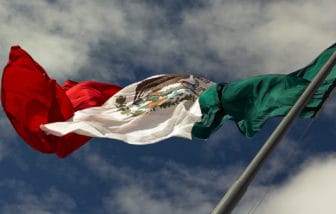An indigenous woman has emerged as a contender for the Mexican presidency in 2018. A member of the Nahua community of the state of Jalisco, Maria de Jesus Patricio Martinez was named the spokesperson, and hence the presidential aspirant, of the new Indigenous Council of Government (CIG).
Representing scores of indigenous groups from across Mexico that were convened by a rejuvenated National Indigenous Congress and the Zapatista National Liberation Army, the CIG was established at a meeting this past weekend attended by about 1,500 people in the southern state of Chiapas, according to Proceso magazine and other Mexican media outlets.
The ethnic groups represented in the 71-member CIG include Mayas, Yaquis, Zoques and many others.
Popularly known as Marichuy, Patricio Martinez is a longtime traditional healer who directs La Casa de Salud Calli Tecolhuacateca Tochan, a community health center in Tuxpan, Jalisco. Supported by the University of Guadalajara, the center also trains indigenous health promoters for the region. In 2015 Patricio Martinez was given a prestigious award by the municipality of Tuxpan for her work in preserving traditional medicine and herbal knowledge.
Quoted in the Mexican alternative news digital publication Desinformemonos.org, Patricio Martinez spoke about the intersection between traditional medicine and the broader indigenous struggle.
“The House of Health has brought us the defense of traditional medicine, indigenous territories and Mother Earth from an anti-capitalist perspective, of the freedom struggle of the indigenous peoples,” she said. “This circumstance has made us active promoters of the National Indigenous Congress, of the forums and meetings in defense of traditional medicine and the strategic alliance between the civilian indigenous movement and the Zapatista National Liberation Army.”
In Jalisco and neighboring Nayarit, violence and repression directed against indigenous Nahua, Wixaritari (Huichol) and Coca peoples by government officials, private business interests and organized crime groups has been on the rise since 2012. Conflicts swirl around land ownership, mining projects and illegal logging. In a weekend article summarizing the situation, La Jornada newspaper noted the 2012 forced disappearance of Nahua leader and lawyer Celedonio Monroy Prudencio and this month’s assassinations of Wixaritari leaders Agustin and Miguel Vazquez Torres, among numerous incidents.
If Marichuy makes it on the ballot for the July 2018 presidential election, she will face an array of candidates from established political parties with financial resources.
While Andres Manuel Lopez Obrador is spearheading a pre-campaign for a third presidential bid, supported by his Morena party and allies from other left-of-center parties, clear frontrunners from other political forces, including independents, have yet to emerge. The personalities in the spotlight so far include Margarita Zavala, Ricardo Anaya and Rafael Moreno Valle for the center-right National Action Party (PAN), and independent Armando Rios Pitter, among others.
Sapped by numerous scandals and unpopular policies like last January’s 20 percent gasoline price hike, or gasolinazo, President Enrique Peña Nieto’s ruling Institutional Revolutionary Party (PRI) will be hard-pressed to postulate a credible, would-be replacement for the president, though Interior Minister Miguel Angel Osorio Chon is one name that keeps popping up in the press.
Significantly greater numbers of women have entered Mexican politics in recent decades, with female presidential candidates increasingly testing the waters in a field long considered a man’s game. In 1982 and 1988, human rights activist Rosario Ibarra de Piedra made historic runs that were later followed up by the Labor Party’s Cecilia Soto (1994), feminist Patricia Mercado (2006) and Josefina Vazquez Mota (2012).
In 2017, Vazquez Mota is the PAN’s gubernatorial candidate in the important June 4 election in Mexico state that pits her against another woman — Morena’s Delfina Gomez — and Alfredo del Mazo of the PRI, who is Peña Nieto’s cousin and a former director of the national development bank Banobras.
Maria de Jesus Patricio Martinez, however, would be the first indigenous woman to make the presidential ballot. And if anything, her candidacy will be a decidedly non-traditional one in many respects. In comments at the Chiapas meeting, indigenous activists were quick to distinguish the new CIG from the existing political parties, framing the initiative as more of an anti-system social movement rooted in an indigenous world consciousness.
“There is great disillusionment with the political parties, and it’s important that it is the CIG which heads this campaign,” said Yaqui leader Mario Luna. “Since the (electoral) law does not permit registering a council, it will register our friend Maria de Jesus. We aren’t offering a magic solution. We are inviting (society) to organize from below.”
Added Zoque Fortino Dominguez: “Political parties have an individualistic conception of the world. Our peoples think collectively.”
Kent Paterson is an independent journalist who covers issues in the U.S./Mexico border region.
